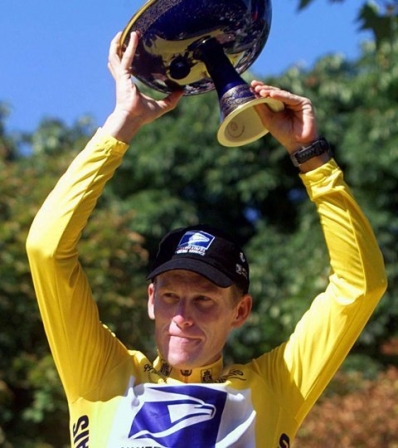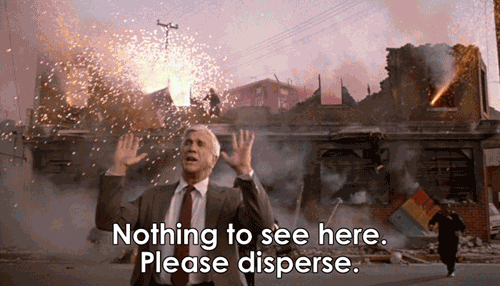Most sports people are cheats.
It sounds like rather a bold statement, but let’s be honest. We’re talking about high pressure environments, where a lot of money and prestige is at stake and the rewards are great. The people involved are highly competitive, and quite frankly would beat up their granny to get a positive outcome.
The pursuit of what 1970s Formula 1 driver Mark Donohue called “the unfair advantage” has been as much a part of sport as training, diet, analysis and the like. Perhaps more so.
Look at any football game. There will be diving, feigning injury and the waving of imaginary yellow cards after minimal contact. All cheating, if a little low level.
It’s virtually impossible to get to the top in any sport without a significant amount of ruthlessness. And sometimes, this ruthlessness will manifest itself in outright dishonesty.
Goldman’s Dilemma is a good place to do a little bit of light reading on the matter, if you’re interested.
The recent scandals involving state-sponsored doping in Russia has brought the story back in a big way, although given they only finished 4th in the medal table at the 2012 Olympics while all this was going on (behind Team GB), it might lead one to wonder what Vladimir Putin was actually getting for all his money.
It’s not a new phenomenon. The “winner” of the 1904 Olympic marathon only won because, as it was later discovered, he had travelled 11 of the 26 miles by car.
I’m not naïve. I am a cycling fan. I can’t afford to be.
But herein lies the problem. Too much cheating, and the sport goes through a looking glass. Excellence is not viewed by seasoned watchers as something to be celebrated, but something to be questioned.
I love cycling, and I have nothing but admiration for each and every pro cyclist, because it is a tough, tough sport. The rewards are not that high when compared with a lot of other sports, and the risks are massive.
You try descending a mountain at 60mph with a wall (or worse, a sheer drop) on your outside. These people are heroes. They are, without exaggeration, risking their lives every single day.
But do I believe it? Not really.
When Lance Armstrong won his 7th Tour de France in 2005, on the victory podium at the end of the race he gave a speech rather reminiscent of Father Ted’s Golden Cleric victory speech.
“…and now we move on to liars…”
One line stuck out, and in time once the truth came out it became a stick to beat him with. “I’m sorry you can’t dream big. I’m sorry you don’t believe in miracles”. In the end, we found out that miracles simply don’t happen.

It’s a juggling act sports have to deal with. What do we do about the cheats? We catch too many, the sport lacks credibility. We don’t catch enough, the sport also lacks credibility.
What do we do with the cheats once we catch them? This is where the SPFL come in.
It’s rare in this day and age for cheating to be uncovered immediately as it was with Ben Johnson, for example. As the Armstrong case proved, it’s almost always years after the fact.
But what you get is a situation where people vote for self interest. Water under the bridge. Mustn’t rock the boat. Look forward, not back. Etc.
It won’t do. Not in itself.
The SPFL are the clubs. And the clubs don’t appear to have the moral courage to enforce their own rules. Which shows, if nothing else, that the people involved are utterly unsuited towards making these decisions.
They’d tried to soften us up, with their talk of “no appetite” and the releasing of statements and spin through favourable journalists, who really should be asking the sort of questions implied in the job title. These are the same people who tried to foist the new Rangers on us in 2012, and tried their damnedest to parachute them into the Premiership, until the clubs, forced as they were by their own supporters, decided otherwise. So the decision, when it came, was no surprise to anyone.

I find it interesting that the SPFL seem so keen in hiding behind the minutiae of its own rules now, given the then governing body ran a coach and horses through their own rules by letting new Rangers into the league in the first place.
If a club had won several titles due to a systematic doping programme? If, instead of EBTs, Rangers had loaded their players with EPO, there wouldn’t be an issue. Sure, because everyone knows Doping Is Bad.
Why financial doping is not viewed in the same way is not entirely clear to me.
Much has been made of the Lord Nimmo Smith decision, which was, rather stupidly as it turned out, made years before the appeals process was completed. The entire decision was made on the assumption that the EBTs were a lawful tax avoidance scheme, and therefore were based on an entirely incorrect premise. To suggest now, when we know that the EBTs were unlawful, that this decision still stands and to have a new enquiry amounts to some kind of double jeopardy simply will not do.
Whether you are cynical enough to believe the timing of the LNS decision was expediency is entirely up to you. I couldn’t possibly comment.
Putting it in its most basic terms, this unlawful tax avoidance scheme allowed Rangers to sign players they could not otherwise afford. That’s it.
Given Sir David Murray said as much under oath, who am I to argue?
It seems obvious to me – surely the whole point in engaging in tax avoidance is to sign players they couldn’t otherwise afford? Otherwise, what’s the point?
As the press release says, “I doubt the prospects of a complaint under Rule A3.1 succeeding. Firstly, there can be no complaint against Newco. That company cannot be in breach of Rule A3.1 because this is an SPL Rule and Newco is not subject to those rules. With regard to Oldco and the club, it is open to question whether the implementation of a tax avoidance scheme is inconsistent with the utmost good faith because tax avoidance is lawful. If the Supreme Court upholds the decision of the Court of Session the result will be that the tax avoidance scheme will have failed but I doubt that it is appropriate to reinterpret past events in light of a court ruling that comes at least 4 years later. The mere fact that the scheme is ultimately held to have been ineffective does not mean that when the scheme was being applied the club and Oldco acted with less than the utmost good faith”.
Well…that’s interesting. I’m no lawyer, but it seems a bit odd to me that it is not “appropriate to reinterpret past events in light if a court ruling that comes at least 4 years later“, given the reason it took 4 years for a court ruling is because that is how long the process takes. You appeal, they appeal, and off it goes to the Supreme Court. It takes time. To in effect time bar this by citing the length of time the legal process actually takes seems somewhat perverse. Showing again how daft it was having the LNS report before the legal process was actually completed.
Should there really be a time bar on cheating?
Also, claiming good faith because tax avoidance is lawful? Doping is not, as yet, illegal in this country. Besides, the Supreme Court ruled the use of EBTs in this instance wasn’t lawful.
If lying to HMRC and the use of side letters is “good faith”, I’d hate to see what bad faith looks like.
The second point I took from this exercise in sweeping under the carpet was, in simplistic terms, we can’t punish new Rangers for the sins of old Rangers.
“The second possibility relates to non-payment of tax. The SPFL now has rules requiring tax to be paid when ‘due’. Those rules were first introduced after Oldco ceased to member of the SPL. The Rules define the date when a formally contested tax liability is considered to fall ‘due’: it falls due when the tax dispute is resolved. That day will only come when the Supreme Court announces its decision. Assuming that the Supreme Court holds that there is a tax liability in respect of the EBT scheme that will be a liability of Oldco (not the club under the current ownership of Newco). There can be no complaint by the SPFL against Oldco because that company is not a member. I have been asked whether it would be possible to bring a complaint against the club on the basis that the SPFL Rules can be construed as referring to any tax due in respect of the activities of a club, even by a past owner. While the point is not entirely free from doubt it is my opinion that the Rules do not apply to tax due by former owners and, therefore, it would not be possible to bring a complaint against Rangers (and Newco) in respect of any failure by Oldco to pay tax”.
The old club/company separation reverse ferret with pike. 5.9 from the Romanian judge.
Clubs will pursue the bottom line. To quote the song, it’s all about the Benjamins. We saw this in 2012 when Rangers died. At my own club, it’s pretty common knowledge that Stephen Thompson would have let new Rangers into what was then the SPL until fan pressure forced him to think otherwise. This situation was mirrored at other clubs. Illustrating that clubs who have such a financial stake in the decision shouldn’t be the ones making the decision. I fully understand why clubs cannot act objectively in such a situation.
This is slightly different to what unfolded five years ago, given that due to the timing of this decision the clubs already have your season ticket money. We don’t have the financial hold over our clubs that we had in 2012.
I wouldn’t pretend to know at this stage what action we fans need to take, but action does need to be taken. This cannot be allowed to end here.
Any gesture of stripping titles would be largely symbolic, of course it would. That’s not really the point. You can’t undo the wrongs, but what you can do is acknowledge them.
Have an asterisk if that helps. Or have no winners, as what happened in the Tour de France from 1999 to 2005.
Symbolism matters. It makes a difference when you look at record books and you know that the name alongside the word “winners” shouldn’t be there, because the title was not gained fairly. It taints the whole spectacle.
The sport cannot move on until the sins of the past are acknowledged. It doesn’t provide, as much as I hate this word, closure.
